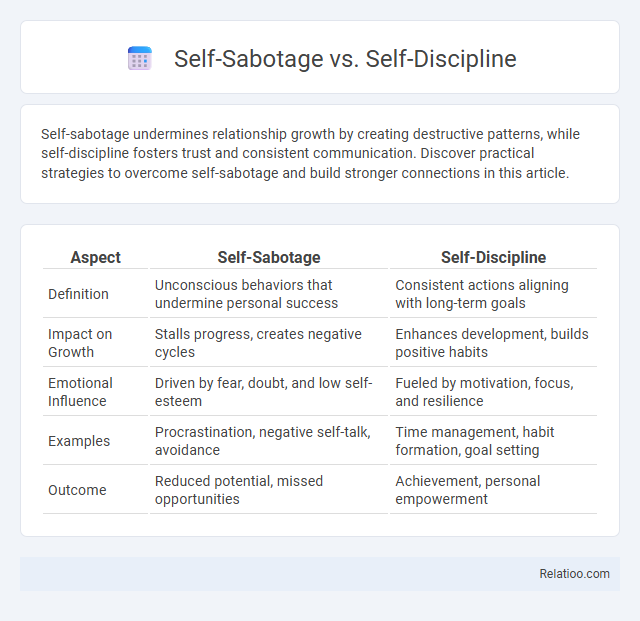Self-sabotage undermines relationship growth by creating destructive patterns, while self-discipline fosters trust and consistent communication. Discover practical strategies to overcome self-sabotage and build stronger connections in this article.
Table of Comparison
| Aspect | Self-Sabotage | Self-Discipline |
|---|---|---|
| Definition | Unconscious behaviors that undermine personal success | Consistent actions aligning with long-term goals |
| Impact on Growth | Stalls progress, creates negative cycles | Enhances development, builds positive habits |
| Emotional Influence | Driven by fear, doubt, and low self-esteem | Fueled by motivation, focus, and resilience |
| Examples | Procrastination, negative self-talk, avoidance | Time management, habit formation, goal setting |
| Outcome | Reduced potential, missed opportunities | Achievement, personal empowerment |
Understanding Self-Sabotage: Definition and Triggers
Self-sabotage involves unconscious behaviors or thought patterns that hinder personal goals, often triggered by fear of failure, low self-esteem, or unresolved trauma. Unlike sabotage, which is intentional harm toward others, self-sabotage stems from internal conflict and anxiety. Recognizing cognitive distortions and emotional responses is crucial for developing self-discipline and breaking these maladaptive cycles.
What Is Self-Discipline? Core Principles Explained
Self-discipline is the ability to control your impulses, emotions, and behaviors to achieve long-term goals despite short-term temptations or distractions. Core principles of self-discipline include goal setting, consistent effort, delayed gratification, and resilience in the face of setbacks. Understanding the difference between self-sabotage, which undermines your progress, and sabotage, which can come from external forces, helps you strengthen your self-discipline to maintain focus and achieve success.
Psychological Roots: Why We Self-Sabotage
Self-sabotage stems from deep psychological roots such as fear of failure, low self-esteem, and unresolved trauma, which conflict with your goals and desires. Unlike sabotage, which is a deliberate act to harm others or external systems, self-sabotage is an unconscious internal process that undermines your progress. Developing self-discipline helps reframe negative thought patterns and fosters resilience, empowering you to overcome these internal barriers effectively.
The Science Behind Self-Discipline
Self-discipline is rooted in the brain's prefrontal cortex, which governs executive functions such as decision-making, impulse control, and goal setting, enabling individuals to resist short-term temptations in favor of long-term rewards. Neuroscientific studies reveal that consistent practice of self-discipline strengthens neural pathways, enhancing cognitive control and reducing the likelihood of self-sabotage behaviors that stem from emotional triggers or automatic reactions. Understanding the biological mechanisms behind self-discipline offers valuable insight into overcoming sabotage tendencies by promoting intentional actions aligned with personal goals.
Self-Sabotage vs Self-Discipline: Key Differences
Self-sabotage involves unconscious behaviors and thought patterns that hinder personal growth, while self-discipline is the conscious effort to regulate actions and maintain focus on goals. Individuals who practice self-discipline develop routines and habits that promote productivity and success, contrasting with self-sabotaging tendencies that create obstacles and setbacks. Understanding these differences is crucial for improving mental resilience and achieving consistent progress in personal and professional life.
How Self-Sabotage Undermines Success
Self-sabotage undermines success by creating internal barriers through negative thought patterns and behaviors that hinder goal achievement. Unlike self-discipline, which promotes consistent effort and resilience, self-sabotage triggers procrastination, fear of failure, and self-doubt, leading to missed opportunities and reduced productivity. Sabotage, often external, involves deliberate actions by others to impede progress, but self-sabotage originates within, making awareness and cognitive intervention essential for overcoming these self-imposed limitations.
Building Blocks of Strong Self-Discipline
Building blocks of strong self-discipline include consistent goal setting, effective habit formation, and emotional regulation to overcome self-sabotage tendencies. Understanding the differences between self-sabotage, which undermines progress through negative behaviors, and sabotage by external forces helps reinforce personal accountability. Cultivating resilience and a growth mindset amplifies the ability to maintain long-term focus and achieve desired outcomes.
Recognizing Self-Sabotaging Behaviors in Daily Life
Recognizing self-sabotaging behaviors in daily life involves identifying patterns like procrastination, negative self-talk, and avoidance that undermine personal goals. Self-discipline, by contrast, relies on consistent habits, goal-setting, and resilience that foster growth and achievement. Understanding the distinction from sabotage--intentional actions by others to hinder progress--helps individuals build awareness and implement strategies to overcome internal barriers effectively.
Strategies to Replace Self-Sabotage with Self-Discipline
Strategies to replace self-sabotage with self-discipline include setting clear, achievable goals paired with consistent self-monitoring to track progress. Implementing positive reinforcement techniques and cognitive-behavioral practices helps reframe negative thought patterns that trigger self-sabotage. Building structured routines and fostering accountability through support networks enhance sustained self-discipline and reduce tendencies toward destructive behaviors.
Cultivating Lasting Self-Discipline: Practical Tips and Tools
Cultivating lasting self-discipline requires understanding the differences between self-sabotage, self-discipline, and sabotage to effectively identify and overcome internal barriers. Practical tips include setting clear goals, creating consistent routines, and using mindfulness techniques to recognize and redirect negative thought patterns that lead to self-sabotage. Your commitment to these tools strengthens your ability to maintain focus and achieve long-term personal and professional success.

Infographic: Self-Sabotage vs Self-Discipline
 relatioo.com
relatioo.com